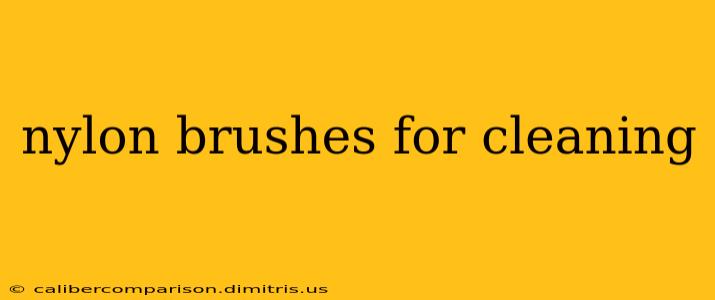Nylon brushes are versatile cleaning tools used across various industries and households. Their durability, softness (depending on bristle stiffness), and resistance to chemicals make them a popular choice for a wide range of cleaning tasks. This guide will delve into the specifics of nylon brushes, exploring their different types, applications, and advantages.
Types of Nylon Brushes
Nylon brushes come in a vast array of shapes, sizes, and bristle stiffnesses, catering to diverse cleaning needs. Here are some common types:
1. Bottle Brushes:
These long-handled brushes feature a nylon head designed to scrub the inside of bottles and narrow vessels. The flexible nylon bristles effectively remove residue and stains from hard-to-reach areas. Different sizes are available to accommodate various bottle diameters.
2. Detailing Brushes:
With their fine, soft nylon bristles, detailing brushes are ideal for cleaning delicate surfaces like car interiors, electronics, and jewelry. Their small size and precision allow for meticulous cleaning without causing scratches or damage. These brushes are frequently used by professionals in the automotive and electronics industries.
3. Scrub Brushes:
These sturdy brushes boast stiffer nylon bristles for tackling tough grime and stains on surfaces like cookware, outdoor furniture, and floors. They're often used with cleaning solutions to enhance their cleaning power. The handle can be either short or long, depending on the intended use.
4. Industrial Brushes:
These heavy-duty brushes employ robust nylon bristles to handle demanding cleaning tasks in industrial settings. They are often used for cleaning machinery, equipment, and large surfaces. These brushes are designed to withstand harsh conditions and intensive use.
5. Paint Brushes (Nylon Bristles):
While not exclusively for cleaning, nylon paint brushes can be repurposed for cleaning intricate details or applying cleaning solutions to specific areas. Their fine tips and controlled application make them useful for delicate cleaning tasks. However, it's essential to clean the brush thoroughly after use to prevent cross-contamination.
Advantages of Nylon Brushes
Nylon brushes offer several advantages over other brush types:
- Durability: Nylon bristles are resistant to wear and tear, providing a longer lifespan compared to natural bristle brushes.
- Chemical Resistance: Nylon is unaffected by many common cleaning chemicals, making it suitable for use with various cleaning solutions.
- Softness (depending on bristle type): Softer nylon bristles are gentle on delicate surfaces, preventing scratches and damage.
- Versatility: The wide variety of shapes and sizes makes them adaptable to numerous cleaning tasks.
- Easy to Clean: Nylon brushes are typically easy to clean and maintain.
Choosing the Right Nylon Brush
Selecting the appropriate nylon brush depends on the specific cleaning task. Consider the following factors:
- Bristle Stiffness: Choose softer bristles for delicate surfaces and stiffer bristles for stubborn grime.
- Brush Shape and Size: Select a brush that fits the shape and size of the surface being cleaned.
- Handle Length: A longer handle provides better reach for cleaning hard-to-reach areas.
Care and Maintenance of Nylon Brushes
Proper care and maintenance extend the lifespan of your nylon brushes. After each use, rinse the brush thoroughly with water and allow it to air dry completely. For stubborn residue, you may need to use a mild cleaning solution. Store brushes in a dry, clean place to prevent damage and contamination.
Conclusion
Nylon brushes are indispensable tools for a wide spectrum of cleaning applications. By understanding the different types and choosing the right brush for the job, you can ensure efficient and effective cleaning while protecting the surfaces you’re cleaning. Their durability, versatility, and ease of maintenance make them a worthwhile investment for both household and professional cleaning needs.

